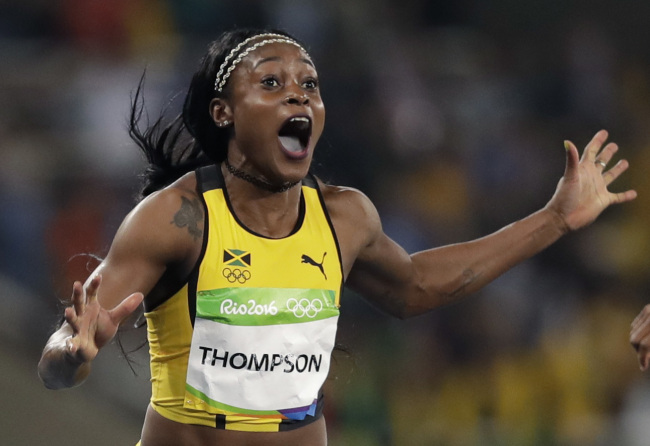RIO DE JANEIRO (AP) – A changing of the guard in women's sprints doesn't mean a redrawing of the map.
That 100-meter Olympic gold medal is heading back to Jamaica, only this time in the hands of Elaine Thompson, the 24-year-old who took down America's best, to say nothing of her training partner, two-time defending champion Shelly-Ann Fraser-Pryce.
 |
Jamaica`s Elaine Thompson wins the gold medal in the women`s 100-meter final during the athletics competitions of the 2016 Summer Olympics at the Olympic stadium in Rio de Janeiro, Brazil, Saturday, Aug. 13, 2016. (AP-Yonhap) |
Thompson turned what was supposed to be one of the most competitive races on the Olympic program into a runaway. Running even at the halfway mark with Fraser-Pryce and Tori Bowie of the United States, Thompson pulled away over the last half and defeated Bowie with a bookshelf-sized slice of daylight in between.
Thompson finished in 10.71 seconds, a full .12 seconds better than Bowie and only .01 off the time she ran at Jamaica's national championships last month. Thompson's 10.70 was the best of five sub-10.8 women's sprints this year and certainly served notice that things could be changing once the sprinters reached Rio.
Three of those sub-10.8 women were in the final – Bowie and another American, English Gardner, were the others -- as was Fraser-Pryce, the 29-year-old who was a brace-faced newcomer when she won her first of two golds at the Bird's Nest in Beijing eight years ago.
She was trying to become the first person to win three straight 100-meter titles at the Olympics. It would've given her one day's worth of bragging rights over Usain Bolt, who has overshadowed her in almost everything despite their dual dominance. Bolt will try to do it on his own in the men's race Sunday.
Fraser-Pryce led the women's final early, but faded, and settles for a bronze medal to go with the green-and-yellow, Jamaican-flag hairdo she worked up for her turn as her country's flagbearer at the opening ceremony.
And now, there's a new champion from the island country that seems to grow them on trees.
Thompson was a late bloomer. She didn't make her high school track team and, until she finished second in the 200 last year at world championships, had barely made a splash on the international scene, tucked behind Fraser-Pryce and the country's seven-time Olympic medalist, Veronica Campbell-Brown, among others.
Thompson's win over Fraser-Pryce at nationals caused a stir, but then both runners took to the sideline – Fraser-Pryce with a toe injury and Thompson with a strained hamstring.
She looked no worse for wear over three heats in Rio de Janeiro. In the final, she got stronger as she approached the line and left what had been billed as an uber-competitive field far behind.
Surprise finalist Marie-Josee Ta Lou of Ivory Coast finished fourth, followed by Dafne Schippers, the Dutch heptathlete-turned-sprinter. Gardner, the champion at U.S. Olympic Trials last month, was two more spots back.
``They are not unbeatable,'' Gardner insisted, when asked about the Jamaicans' unending dominance in these races.
When the lights are brightest, though, they really are.








